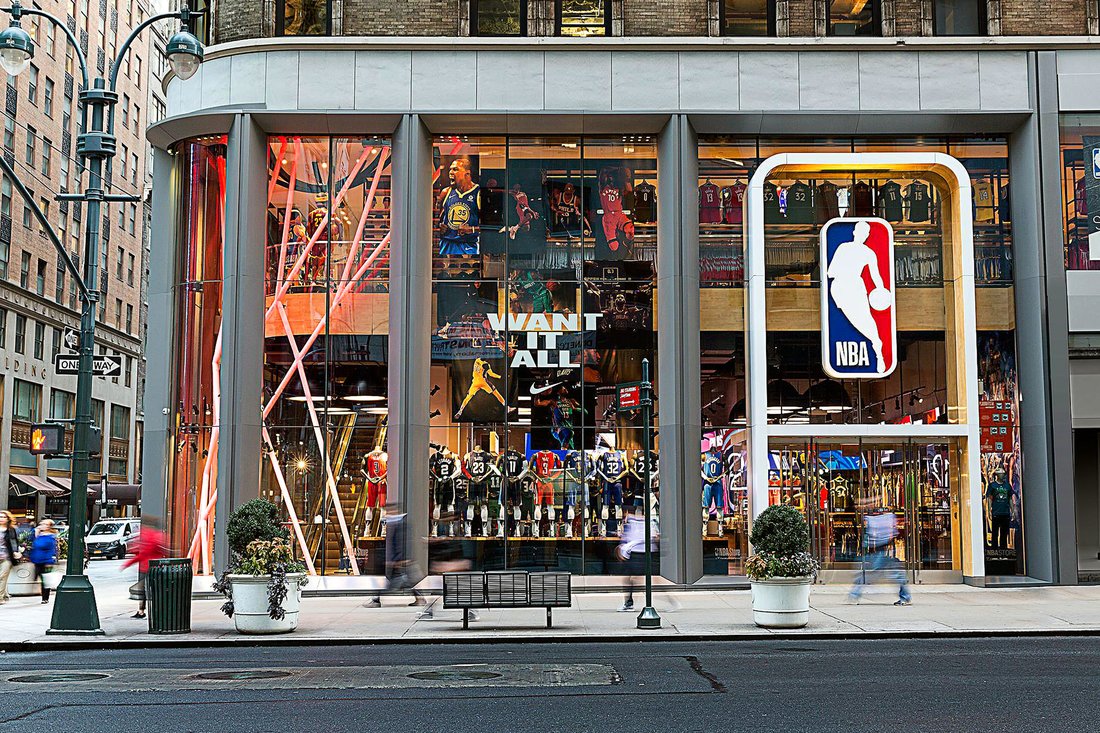勒布朗转会,让这家公司大赚
|
6月末,就在篮球界屏息期待超级明星、自由人勒布朗·詹姆斯明年会加入哪支球队的消息时,在线授权体育商品零售商Fanatics却在忙着做球衣。这位前克利夫兰骑士队的球员会选择洛杉矶湖人队,还是费城76人队? 对于Fanatics来说,这一点无关紧要。因为在肯塔基、北卡和佛罗里达州的仓库中,这位零售商正在生产两支球队的空白球衣,而且随时可以把詹姆士的名字和球衣号印上去。当四次荣获NBA最有价值球员荣誉的勒布朗宣布,以1.54亿美元的四年期合约价格加入湖人队时,Fanatics马上就开足马力印制球衣。得益于独家授权和生产权,该公司在数小时之内便把新球衣摆上了自家网站和NBA.com的货架。与预期的一样,詹姆斯的湖人队球衣成为了网上的热卖商品。 这种上市速度和生产灵活性得益于Fanatics数年来致力于成为21世纪零售商的不懈努力,即成为一家集科技、物流和生产于一身的公司,而且Fanatics与职业体育联盟达成的独家代理权数量也在不断增长。Fanatics的创始人、所有者和执行董事长迈克·鲁宾称这种模式为“垂直商业”。不管叫什么名字,这一模式让Fanatics备受职业体育联盟的青睐,而Fanatics也借此揽获了亚马逊所没有的事物——更多的独家代理权。 鲁宾向《财富》杂志透露,“如果你销售的商品在阿里巴巴或亚马逊也能买得到,那么你就该卷铺盖回家了。” |
IN LATE JUNE, as the basketball world waited with bated breath for word of where superstar and free agent LeBron James would play next year, online licensed sports merchandise retailer Fanatics was busy making jerseys. Would the former Cleveland Cavalier choose the Los Angeles Lakers or the Philadelphia 76ers? To Fanatics, it didn’t matter. At its warehouses in Kentucky, North Carolina, and Florida, the retailer prepared blank jerseys for both teams, ready to be finished with James’s name and number. Once the four-time National Basketball Association Most Valuable Player announced he would become a Laker in a four-year, $154 million contract, Fanatics sprang into action. Within hours, it had new merchandise ready for sale on its own website and on NBA.com, thanks to exclusive licensing and manufacturing rights. As expected, James’s Lakers jersey flew off the digital shelves. That kind of speed to market and manufacturing flexibility, coupled with Fanatics’ growing number of exclusive deals with the professional sports leagues, is the result of years of effort to become a 21st-century retailer: part tech company, part logistics company, part manufacturer. Fanatics’ founder, owner, and executive chairman, Michael Rubin, calls it “vertical commerce” or “v-commerce.” Whatever the name, it has endeared Fanatics to pro sports leagues, which in turn have rewarded Fanatics with something Amazon doesn’t have: more exclusive rights. “If you’re selling the same merchandise as what’s available on Alibaba or Amazon, you should quit and go home,” Rubin tells Fortune. |

|
5月,国家橄榄球联盟授予Fanatics一项10年期的独家代理权,从2020年起制作和销售面向粉丝的国家橄榄球联盟服饰。(耐克将负责提供球员的赛场装备。)NBA专员亚当·斯尔维在去年的一次会议上谈论鲁宾时表示,“他是这块市场的所有者。”就像超级明星詹姆斯一样,成为这一领域的王者是件十分有利的事情:私营企业Fanatics是美国体育授权服饰市场数字业务的主导者,该公司今年的营收有望达到230亿美元,而8年前为2.5亿美元。研究公司IBIS World估计,美国授权服饰市场的年销售额约为78亿美元,每年增长约3%。 对于电子商务革命来说,这一领域已经足够成熟。授权职业联盟体育商品的在线销售已从10年前占美国零售总额的1%升至如今的20%。IBIS World分析师克莱尔·欧康纳说:“在体育领域,事情可能会变化的异常之快,只要球员在某一场比赛中发挥出色,他们的受欢迎度就会迅速升温。在线上,人们转移注意力的速度会快得多。” Fanatics的发展轨迹让它获得了来自于顶级投资者的注资,包括Andreessen Horowitz、Silver Lake、阿里巴巴和软银。软银在2017年领投了数十亿美元的融资轮,并对Fanatics给出了45亿美元的估价,其他投资者包括国家橄榄球联盟和职业棒球大联盟。这并非是鲁宾第一次与日本财团打交道。1999年,软银对鲁宾组建的GSI Commerce公司注资,他于2011年以24亿美元的价格将该公司卖给了eBay。(其中包括Fanatics,作为协议的一部分,他留在Fanatics任职。)鲁宾的其他业务还包括抢购网站 RueLaLa和ShopRunner。 GSI已经获得了五个联盟的电商销售权,但鲁宾深知,自己新成立的公司不应只局限于销售。因此,他在揽获更多代理权的同时组建了生产线。去年,Fanatics从VF Corp手中收购了运动服饰生产商Majestic,后者通过为职业棒球大联盟制作赛事队服。Fanatics还从CAA手中收购了体育授权代理商Fermata Partners,以打造其大学业务。 Fanatics每年在科技和生产设施方面的花费达到了1.4亿美元,但其策略并非完全专注于数字业务。公司最近签署了一项协议,在350家J.C. Penney店面内部打造品牌店,并接手了全美冰球联盟曼哈顿旗舰店的经营。(公司已经在经营NBA在曼哈顿的旗舰店)。Fanatics还在顶级体育场馆运营着40个球队的店面,这一数字还在不断增加。在某些店面,公司允许消费者在店面在线下单。 Fanatics半数收入来自于自制的产品。鲁宾认为其年营收在不久的未来有望达到100亿美元。 他说:“体育是最好的一个行业。知识产权可谓是价值连城。”(财富中文网) 本文刊登于《财富》2018年9月1日刊,标题为“令人欢呼雀跃的授权业务”。 译者:Charlie 审校:夏林 |
In May, the National Football League gave Fanatics a 10-year exclusive to make and sell NFL clothing for fans starting in 2020. (Nike will handle on-field gear.) “He owns this marketplace,” NBA commissioner Adam Silver said of Rubin at a conference last year. As with the superstar James, it’s good to be king: The privately held Fanatics, which is set to rake in $2.3 billion this year, up from $250 million eight years ago, dominates the digital part of a U.S. sports licensed apparel market that research firm IBIS World estimates to be worth $7.8 billion in annual sales and growing 3% a year. The category is particularly ripe for an e-commerce revolution. Online sales of licensed pro league sports merchandise have grown from 1% of total U.S. sales a decade ago to 20% today. “With sports, things can change so fast—a player has a great game, they shoot up in popularity. When you’re online, you can shift your focus much more quickly,” says IBIS World analyst Claire O’Connor. Fanatics’ trajectory has earned it funding from top investors including Andreessen Horowitz, Silver Lake, Alibaba, and SoftBank, the last of which led a billion-dollar financing round in 2017 that included the NFL and Major League Baseball and valued Fanatics at $4.5 billion. It’s not Rubin’s first time doing business with the Japanese conglomerate. In 1999, SoftBank invested money in GSI Commerce, a Rubin-founded firm that he sold to eBay in 2011 for $2.4 billion. (It included Fanatics, which he held on to as part of the deal.) His other businesses have included flash-sales site RueLaLa and ShopRunner. GSI had obtained e-commerce rights for five leagues, but Rubin knew he had to go beyond sales in his newer venture. So he set about acquiring more rights as he ramped up manufacturing. Last year Fanatics bought athletic apparel maker Majestic, which makes on-field uniforms for the MLB, from VF Corp. It also acquired sports licensing agency Fermata Partners from CAA to build up its college business. Fanatics spends about $140 million a year on its tech and manufacturing firepower, but its strategy isn’t purely digital. It recently signed a deal to build branded shops in 350 J.C. Penney stores and took over operations of the National Hockey League flagship store in Manhattan. (It already runs the NBA’s.) The company also operates 40 team stores and counting at top sports venues; at some, it can fulfill online orders placed on site. Fanatics derives half its revenue from products it makes itself. Rubin believes its annual revenue could grow to $10 billion in the not-so-distant future. “There is no better category than sports,” he says. “The intellectual property is so valuable.” A version of this article appears in the September 1, 2018 issue of Fortune with the headline “Licensed To Thrill.” |













